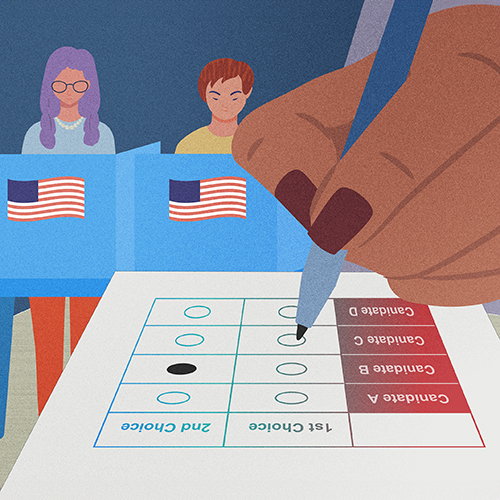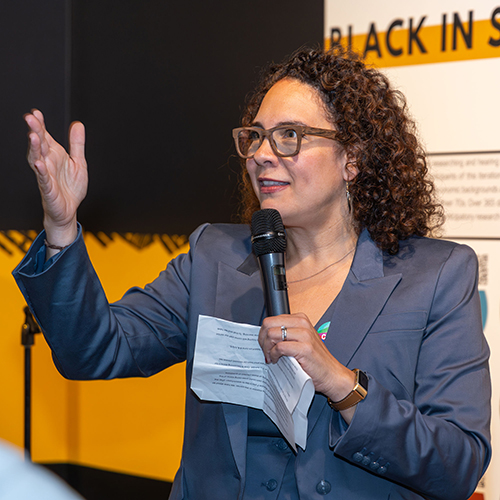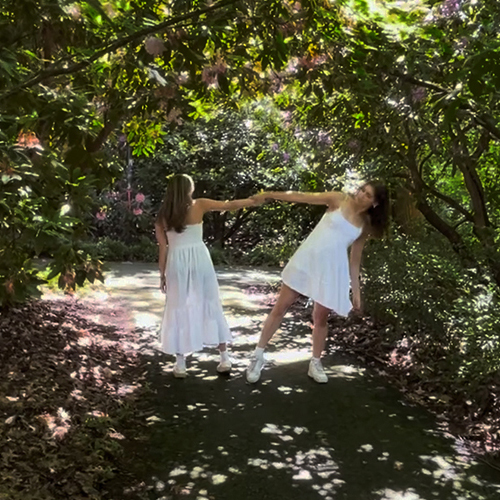When Tupac Shakur was a fixture in the hip-hop scene in the 1990s, Georgia Roberts was a huge fan. Eight years after his untimely death at age 25, she still is.
So are countless others, as Roberts discovered when she offered a UW course on Shakur and texts that influenced his work, ranging from Sun Tzu’s The Art of War to Machiavelli’s The Prince. The popular course has been offered twice and has led to a discussion series at the Seattle Public Library.
Roberts, a graduate student in the Department of English, says that the course evolved from a focus group in the Comparative History of Ideas (CHID) Program. Focus groups are reading groups offered for credit but not graded, which students can offer on topics of personal interest. Roberts had already offered focus groups on Henry James’s travel narratives and the early history of hip-hop culture when the idea for a Tupac Shakur focus group emerged.

“I kept referring to Tupac’s work in class,” says Roberts. “It became sort of a running joke that all I wanted to talk about was Tupac. Finally I thought, ‘Maybe I could do a focus group solely on his work.’”
What made the idea feasible was Tupac Shakur’s interest in a wide range of literature, which was reflected in his own writing. “It’s been widely reported that he was a very avid reader,” explains Roberts. “He was into religious, political, and cultural theory. In interviews, he often paid homage to literary giants like William Shakespeare and Maya Angelou.”
Roberts’ focus group attracted about 20 students, some of them fans of Tupac and others simply curious. They read and discussed a book each week. All were titles on Shakur’s shelf at the time of his death.
Anna Waters was a freshman when the focus group was offered, and being “the resident obsessive-compulsive Tupac fan,” she couldn’t believe her luck. “Tupac has extremely wide appeal,” she says. “The emotions he brought to his work are really broad. Who doesn’t understand pain and loneliness and feeling like ‘the other’?”
Word about the focus group travelled fast. It received considerable media coverage, and after someone posted the syllabus online, Roberts heard from people all over the country.
Given the positive response, CHID asked Roberts to develop a 400-level course covering similar content in more depth. The course brought together 30 students from a wide range of disciplines, including CHID, business, biology, and religious studies.
“Comparative study is what CHID is all about so the method of the course was a good fit,” says Roberts. “We studied Tupac’s ideas alongside Nietzche, Frantz Fanon, and other writers and philosophers and looked for connections. The students challenged each other’s assumptions about categories like race, class, and gender, as well as individual and collective ideas about artistic ‘form’—all things, in my opinion, that students ought to be grappling with at this level.”
The course had a waiting list and was offered again during summer quarter. That’s when the Seattle Public Library came calling.
The coordinators for the library’s young adult programs had been seeking ways to expand their programming. Having read a Seattle Post-Intelligencer article about Roberts’ course, they saw possibilities for reaching a broader audience and asked Roberts to plan a three-session book discussion group suitable for young adults.

“As we talked more, I realized what a unique opportunity I was being presented with, and I really wanted to use it as a way to work collaboratively with undergraduate students from my class,” says Roberts. “If we were going to attempt to have a dialogue around some of these books, the students’ insights and expertise made their partici-pation important.”
Roberts created a working group with four student volunteers who decided which books to include for the library sessions and how to frame the discussion. “We were all very excited that what we were doing in class might turn into a more public conversation,” recalls Roberts.
The group decided to focus on one book for each session, starting with The Art of War, then the poetry of Nikki Giovanni, and finally Richard Wright’s Native Son.
No one, including the librarians, knew who would show up for the discussions and what their interest in Shakur might be. They needn’t have worried. Each session attracted up to 40 people, with an interesting mix of ages and opinions of hip-hop culture. There were mothers of teenagers who wanted to understand their children’s obsession with Tupac Shakur, as well as teachers, teens, and a mother of four children who told the group she found daily inspiration and hope in Tupac’s songs and poems.

“When you have a public space like the library, you get this conglomerate of people from different backgrounds,” says Roberts. “That was the amazing part. The university classroom can be pretty predictable at times, but we went into the library not knowing what might happen. Sometimes it felt like having class in the middle of the city. Other times it felt kind of like a town hall meeting. Totally unpredictable, but in a really good way.”
The library was so pleased with the series that it is scheduling more sessions this summer.
“It’s weird,” says Roberts, marveling at what her interest in Tupac’s work has yielded. “This project truly has a life of its own. I’m so thankful for the opportunity to teach something I’m so passionate about as a graduate student. I totally feel spoiled now.”
As does Waters, who has been part of Roberts’ focus group, course, and library program. “At first it was about two things I love—literature and music—but it’s become more,” says Waters. “It’s allowed me to delve into the idea of cultural studies—how we construct our realities and who we place in this narrative of cultural history. I’m immersed in it.”
What would Tupac Shakur think about courses and library sessions focusing on his work?
“There’s this great quote from Tupac,” says Roberts. “He says, ‘I don’t think I’ll change the world, but I guarantee I’ll spark the brain that will change the world.’ As someone who studies literature, I’ve always believed in the transformative power of reading to spark and ignite social change. So if people are encouraged to read by his example, well, I think he’d see that as a cool thing.”
More Stories

Democracy by the Numbers
Mathematics and Democracy, an undergraduate mathematics course, explores the role of math in many aspects of democracy, from elections to proportional representation.

Interrupting Privilege Starts with Listening
Personal stories are integral to Interrupting Privilege, a UW program that leans into difficult intergenerational discussions about race and privilege.

Dancing Across Campus
For the dance course "Activating Space," students danced in public spaces across the University of Washington's Seattle campus this spring.